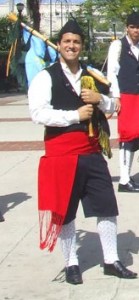Gaitero Arturo Miguel Perez
 Tradition. Tradición. Both the English and Spanish words originate from the Latin word traditio, a noun taken from the verb traderere or tradere (to impart, to hand over, to transmit). Culture is what defines humanity, and society is reliant upon teachers and mentors to transmit culture down through generations. A break in the chain of transmission and culture can be lost. It can die, vanish.
Tradition. Tradición. Both the English and Spanish words originate from the Latin word traditio, a noun taken from the verb traderere or tradere (to impart, to hand over, to transmit). Culture is what defines humanity, and society is reliant upon teachers and mentors to transmit culture down through generations. A break in the chain of transmission and culture can be lost. It can die, vanish.
In Cuba today there is a resurgence of the gaita tradition. Gaita is the Spanish word for bagpipe. The Galicians and Asturians of Northern Spain were the dominate immigrant groups in Cuba at the turn of the 20th century. When they settled in Cuba, they imported their musical and dance traditions.
Sadly by the end of the 20th century, the knowledge of this culture was fading in Cuba.
However, the older generation of Spanish immigrants recognized the importance of leaving their Cuban-born descendants the gift of their traditions, and grandparents shared stories of their ancestral homeland.
One grandmother, Filomena Garcia Candida, was determined that her grandson, Arturo Miguel Perez, become an Asturian gaitero (as bagpipers are called in Spain). Arturo started studying the gaita with professor Raul Baras at the age of nine, and quickly became inseparable from the instrument, joining various bands.
Currently, Arturo is the leader of “La Banda de Gaitas de La Habana” (The Pipes of Havana band), the official group of the Federation of Asturian Associations in Cuba. All of the pipers in the troupe are under thirty, and Arturo himself is only 28.
Asturian gaita professors Xuacu Amieva and Flavio Benito have travelled from Spain to mentor Arturo and his band, and Arturo’s music has attracted international attention; he has performed in Asturias, and at the Festival Interceltique in Lorient, France.
Arturo has also performed in Nova Scotia – at North America’s premier Celtic festival, Celtic Colours International Festival, in Cape Breton – with a group of gaiteros from Cuba. The Caribbean pipers were embraced enthusiastically by other artists and curious fans at the festival. Since their international debut there in 2008, the Cuban pipers have welcomed Celtic musicians from Canada and beyond to their beautiful island. Arturo’s band hosted a Tartan Day celebration in 2009 in Havana with Flavio Benito and Cape Breton fiddlers Chrissy Crowley and Dawn Beaton, and his band also takes part in the annual CeltFest Cuba festival held every April, an event sponsored by Culture Ireland and featuring Celtic artists from the world over.
Max MacDonald, co-founder of Celtic Colours, visited Arturo last year. Every Saturday morning the band meets at a historic building on Havana’s famous Paseo del Prado, the elegant boulevard that connects Havana’s Parque Central to the sea. It was a surprise visit. When the elevator doors opened, Max witnessed a charming scene. “I saw Arturo seated at a table with a dozen smiling attentive children giving a lesson on the chanter. It was so moving to see this dedication to keeping a culture alive.”
Not only is Arturo the leader of the Asturian band, he is also a professor at the International School of Music in Havana. He has a music degree from the world-renowned Amadeo Roldan Conservatory in Havana, and is also a graduate of Spain’s Escuela de Asturianía. As well as a gaitero, Arturo is also an accomplished saxophonist and composer. His music has been praised internationally, and in 2010 he was invited to compete for the MacCrimmon Trophy – an invitation-only event for the best pipers from around the world in Lorient, France. Unfortunately, Arturo could not secure the funds to travel that year and it was a profound disappointment for him to have to decline the invitation to be the first Cuban representative at the prestigious international event.
Arturo has overcome many challenges in his efforts to promote the piping tradition in Cuba. His international experiences inspired him to found the first “Pipers Gathering” in Havana with Cuban pipers in 2012. This year he is organizing another gathering for November, and has extended the invitation to all pipers globally who would like to celebrate the joy of music with the instrument that is common to all the Celtic nations, the bagpipe. ~ By Maria Watson
www.bandadegaitasdelahabana.blogspot.ca
gaitasdelahabana@gmail.com



















Leave a Comment